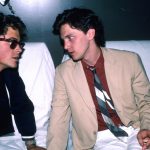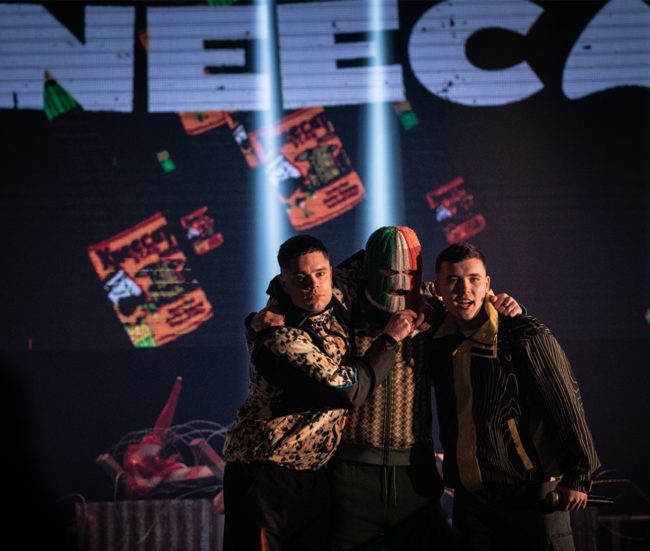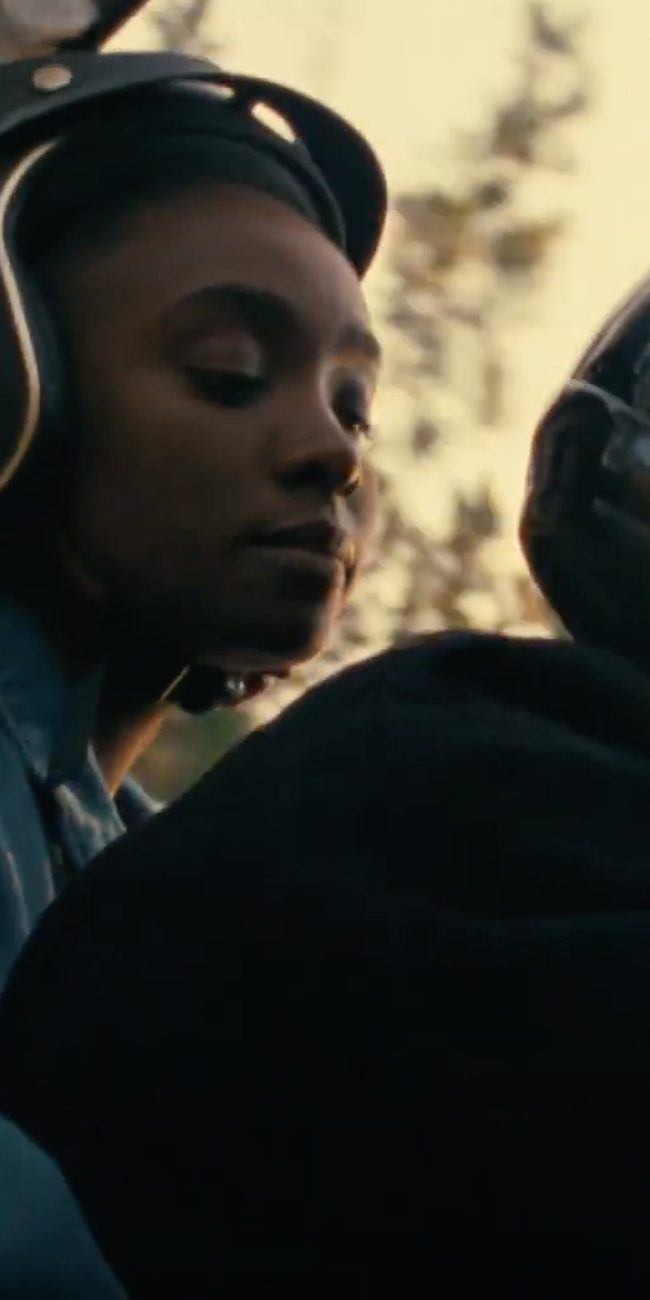A Conversation with Dawn Porter (THE LADY BIRD DIARIES)
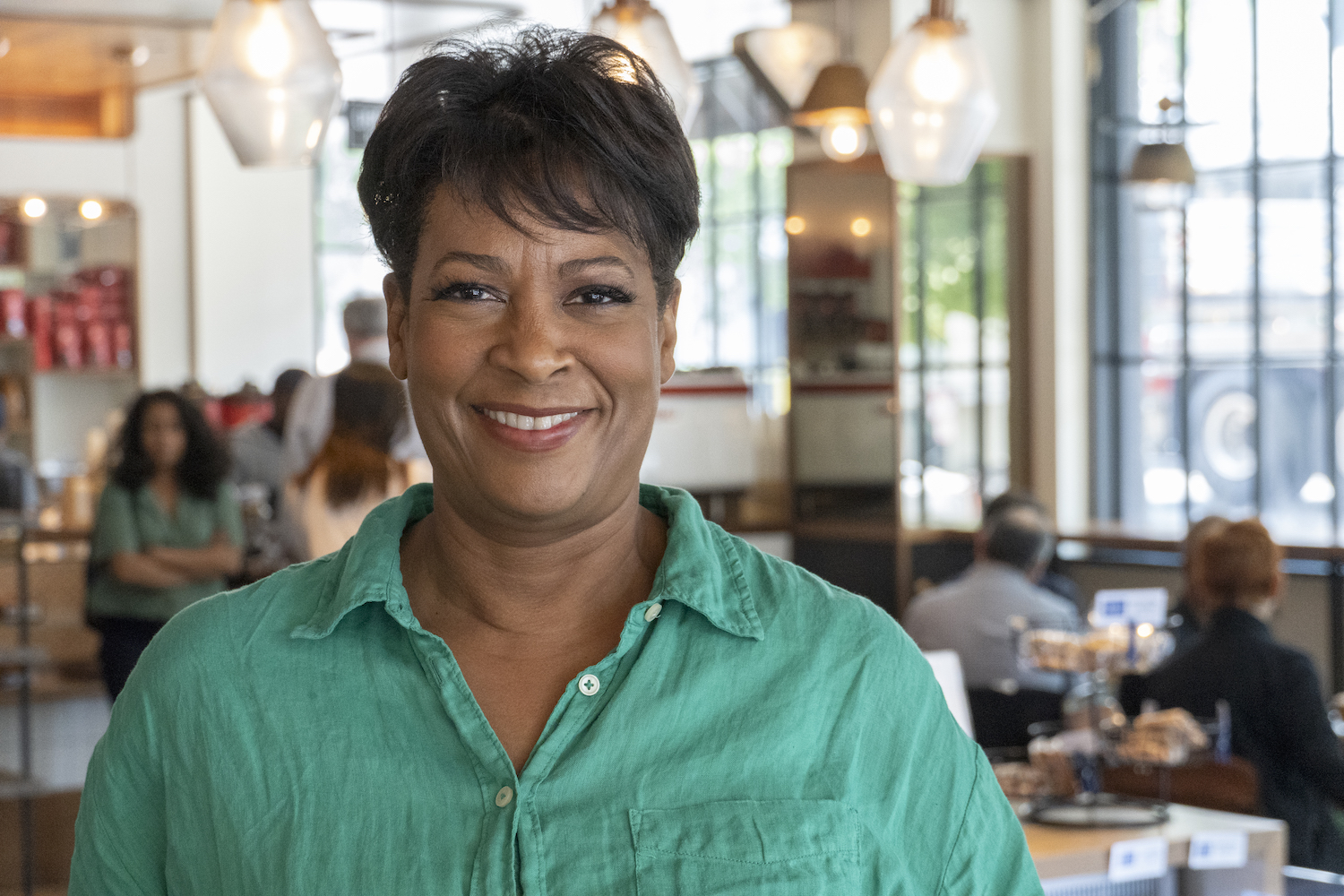
I have long admired the work of prolific documentarian Dawn Porter, and I was finally able to sit down with her in person at the inaugural DC/DOX Film Festival. We met to discuss her latest film, The Lady Bird Diaries (which I reviewed out of SXSW 2023). In it, Porter uses the audio recordings made by first lady Lady Bird Johnson, President Lyndon Baines Johnson’s wife, during her time in the White House. The movie is both a tribute to its subject’s sharp intelligence and wit and a fresh take on a well-worn history. Our conversation has been edited for length and clarity.
Hammer to Nail: How did your involvement with this particular project come about? Was it pitched to you once the recordings were found, or did you find out about the recordings and say, “I have to make a film about Lady Bird Johnson?”
Dawn Porter: I wish I could say I found the recordings, but I used to work at ABC News and so I have a lot of friends there. And at that time Jackie Glover was the executive there and she knew that I had made Bobby Kennedy for President and thought I might be interested in this time period. So she called me and said, “We have this podcast. It’s doing really well. Do you think it could be a film?” That’s literally all she said. And I was like, “Let me listen to the podcast. Let me start listening to the tapes.” And then immediately I was just captivated by Lady Bird’s voice. You’re literally just transported back in time. I’ve lived in DC for 10 years. I went to Georgetown Law School here. I love DC. I’d made a Pete Souza movie, so it just felt like the right thing for me. But what really sealed it for all of us was just listening to her voice.
And I was kind of interested in a new challenge. I’ve done a lot of vérité films and I was listening to her talk, and going back in time, and I thought, “What if there are no talking heads here? What if it’s just her?” And that really got cemented as a goal for me when we started looking for the archive, because when we first looked for the archive, only two pages came up. And I was like, “There’s got to be more than that.” If you put in “Mrs. Johnson,” more comes up. If you put in “president’s wife” and the date, more comes up. But then we quickly realized there was a whole lot of archival that she was in, talking, participating, where she wasn’t even noted. And then I was like, “No one’s talking for her anymore. We’re going to just let her say what she wants to say.” So that’s how it started. And I can’t speak for Jackie, but I know I said, “Yeah, we’re not going to interview anybody.” And I don’t think that’s what they expected, but I’m so glad we did it that way.
HtN: I agree. It makes the film very specific to Lady Bird Johnson. Now, you’ve made films about abortion access, Pete Souza, John Lewis, the Tulsa Massacre, and now Lady Bird, among many others. What do you see as a through line, if any, to your work? Do you see some continuity there?
DP: I do, but sometimes you don’t know what the connection is until you’re kind of in it. And for me, all of these people are unlikely leaders in some ways. John Lewis grew up in Alabama as the son of sharecroppers and goes on to be one of the most significant civil-rights leaders of our time. Lady Bird grew up in East Texas, roaming around the woods. Her mother died when she was young. She wasn’t poor, but she wasn’t really wealthy, and she got married really young. Lyndon Johnson asked her to marry him on their first date, and she never saw herself as the person taking the limelight. And she’s kind of put into this situation, but she made it her own. And she did so much for women and for people of color that was really surprising, given her background. She was a 1950s senator’s wife and then just thrust into the presidency at this formative time in America, with civil rights happening, Vietnam, the role of women changing, and she’s navigating that period of change.
And same for Bobby Kennedy. I mean, here’s somebody on the total opposite of the spectrum. He’s born into immense wealth and privilege, but he’s literally like the runt of the litter. He’s not expected to do much at all. He’s supposed to be JFK’s wing man, and instead he becomes the story at some point. So for all of these people, they didn’t have to do what they did. And I’m really interested in what spurred them to become the leaders and the people that they became.
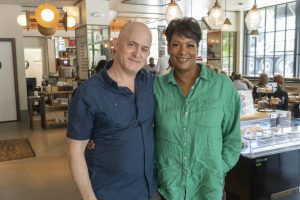
Our Chris Reed and filmmaker Dawn Porter
HtN: You mentioned how Lady Bird did so much for people of color. Obviously, so did her husband, who pushed the Civil Rights Act forward, as well as the Voting Rights Act, appointed Thurgood Marshall to the Supreme Court. But he’s a man of many contradictions. The more I’ve read about him, the more I’ve discovered that he had no problem using racist language, pulling racist pranks. I know your film is about Lady Bird, but how do you see LBJ evolving? How could he become this person who did these really important things, given his background?
DP: I think you could say the same about Lady Bird. I mean, I think people are complicated and I think how Johnson was raised…Johnson also had many affairs, and yet he loved his wife. He would’ve been canceled if he was working now, and yet he made some of the most important advances for civil rights, signing the Voting Rights Act, Civil Rights Act, appointing Marshall to the court, appointing Marshall before he appointed him to the court to be solicitor general, and doing it very specifically. And yet he uses the N-word. He’s not woke, but in a lot of ways he was right.
And so, I think you can hold them to account for all parts of their behavior. You can say that was wrong, shouldn’t have done that, wish he hadn’t. But you can also say, “But what he did do was really important and we’ve all benefited from what he did do.” So that’s kind of how I see it. And I think that’s important for documentary to not shy away from the hard stuff. I mean, for Lady Bird, she was criticized for having sharecroppers on her property, for her interactions with Eartha Kitt, which were less than sensitive. And yet she also forged this very strong friendship with Walter Washington [first Mayor-Commissioner of Washington, DC, who was Black]. Johnson appoints Walter Washington to become the first mayor. If you remember, DC is a territory. We still don’t have voting rights in Washington, DC. Let me say that again, we still do not have home rule in Washington, DC, and the Johnsons, both of them contributed to the advances that DC had.
So they are kind of a study in contradictions. If you just want to look at the surface, I think what I was interested in is what they did do. And I kind of leave it to other people to focus on what they didn’t. But I think that that’s part of the interesting thing about the story. It wasn’t like they were Mother Teresa, but they both were doing really important work in the way that they wanted to contribute.
HtN: So 123 hours of tape is what we have from Lady Bird Johnson! Did you listen to all of it? And if so, what was that experience like?
DP: I would say that the film team listened to all of it. I did not. Lady Bird also had a lot of discussion about her daughter’s wedding. She had a lot of discussion about clothes, and Gunsmoke, and a lot of things that were kind of tangential. She was a huge Gunsmoke fan, so much so that we put it in the movie because she was like, “My favorite thing to do is sit and watch Gunsmoke.” Because there was so much, we divided it up. And then, you asked about the connections between some of my other work. So it’s definitely women’s rights, civil rights, leadership, but there’s also a story about their marriage and power, and what we don’t know about the sacrifices that our leaders make.
So once we picked a handful of themes, then we could narrow down what parts of the tapes speak to those themes. And then the other thing was being kind of stubborn about not having any talking heads, which was a limitation. What do we have archivally to show, to illustrate? And where can just having the tapes married to the archival, how does that juxtaposition tell us something new? So the archive is not B-roll, it is actually the visuals. It’s all you have, which really elevates it. And then in some places we hired people. I’ve worked a lot with Molly Schwartz, who’s a graphic designer. And so some places where we had nothing, I asked Molly to do something. At first, it was sketches, she just was sketching. And then I asked, “Can you make them move?” And so we added some animation to this, which I hadn’t really worked with before. So that was really fun.
But I think you first have to figure out why you are making this movie in the first place. And for me, living in DC and knowing the scrutiny that politicians get, knowing the scrutiny that women get, when I made The Way I See It, about Barack Obama’s photographer [Pete Souza], it also shows the scrutiny that family was under. And I was thinking about that a lot, about how you live your life in public. I was thinking about what kind of mother you can be in public. Do you always do the right thing with your kids? I can’t control my kids. And there’s a lot that the whole family endures in order to be good stewards of the White House. And so I was interested in that.
HtN: Do you have a sense of how the Johnsons’ partnership in the White House compares to other couples in the White House?
DP: I do. If you notice in the first 10 minutes of the film, when Lady Bird’s meeting Jackie Kennedy for the first time after John F. Kennedy has been killed, she says, “We didn’t even want to be vice president.” She’s saying “we,” and that’s really intentional. It’s not a slip of the tongue. The Johnsons were very much a pair. Lady Bird is the person who buys the radio station in their home state of Texas that actually becomes the basis for their wealth later on. They are very much a political couple. And if you remember, there was no plan of succession for the presidency when JFK was killed. So Johnson had no vice president for serving out the rest of JFK’s term. And Lady Bird was one of his closest advisors. She was in every meeting. So they very much worked as a team.
They also have a really great love story. Part of her ferociousness and her motivation comes from the fact that she loved her husband and she believed in her husband. And as I said, he was not a perfect man. He was not a perfect husband. He certainly had many affairs, which you wonder about, since he clearly adores her. And yet he had affairs, which she doesn’t mention. The only mention in those 123 hours that she has about Johnson’s infidelities was when Nixon was with Johnson in his private bedroom. And she said, “Well, you never know who you’re going to find in Lyndon’s bedroom.” So they were very much a marriage of equals. I think he really respected her intellect and her judgment. And she knew that and she didn’t hold back.
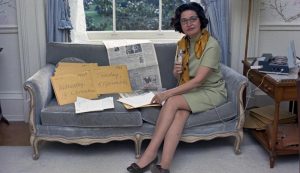
A still from THE LADY BIRD DIARIES
And though I’m not quite as intimately familiar with Barack and Michelle Obama—I haven’t studied them, though I have met them on many occasions and I see how they are together—what I think about with the Obamas is how they found their equality in their marriage by way of service. So, Michelle Obama, double Ivy League graduate, who ran a hospital system, is a very accomplished executive, realizes she’s not going to have a job for pay in the White House. And yet she finds a way to do really significant work. And I think that that is a story that is very common to all of the first ladies. They all had to find how to use their voice. And there’s a lot of sacrifice that happens. Michelle Obama’s a brilliant woman, she’s a brilliant writer, she’s a wonderful mother, and she clearly had to make some sacrifices because of her husband’s occupation.
HtN: You went to Georgetown Law and have a law degree. How did you go from that to becoming a documentary filmmaker? Was that always your plan?
DP: No, it was not the plan. I am an unlikely filmmaker. So, my father was a photographer and I always had a camera from the time I was 15 years old, and I always loved taking pictures. And then I realized you could make them talk. And that was pretty fun. We used to actually make Super 8 movies when I was little. But I wanted to be a lawyer and I was a happy lawyer, and I worked here in Washington, DC. I worked for a firm for five years. I did litigation. I took a lot of depositions as a lawyer. And when I moved to New York City, I was also interested in journalism and I probably could have done one or the other and I kind of went towards law. And when I was working at ABC, I was a Standards and Practices person. And the way that my boss organized that job is she really liked my law background because I could do research. She would have me go read the source material if we were doing something like this big story on organic food, and she was like, “Read the studies and make sure we’re doing it right.”
So that was really interesting. But then I got to see how, if you’re a lawyer/litigator like I was, what you do is you craft a story. You’re trying to convince people of the way that you see things. And so making films, making documentaries, is kind of the same. You’re crafting a story so that something complicated can become understandable to people who don’t have experience with it. So I found a lot of similarities in those two jobs. But then making films, it kind of satisfies that creative visual sense that I have. And so it wasn’t the plan, but it’s such a great marriage of so many things that I love to do. I love pushing myself, I love learning new things. I love going into places I’ve never been, like the White House. And then I also love the artistic outlet. So it wasn’t the plan, but it’s a good ride.
HtN: Well, I’m so grateful that you did that because I’ve really enjoyed watching your films.
DP: Thanks!
– Christopher Llewellyn Reed (@ChrisReedFilm)




